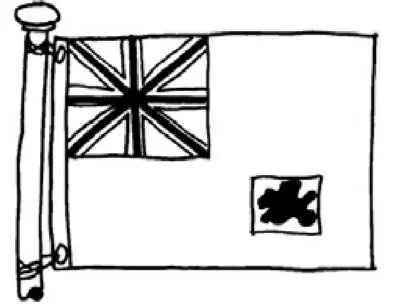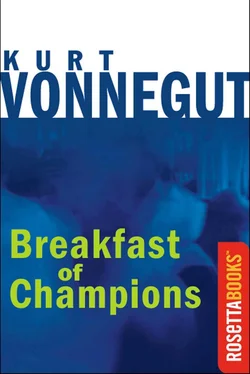Kurt Vonnegut - Breakfast of Champions
Здесь есть возможность читать онлайн «Kurt Vonnegut - Breakfast of Champions» весь текст электронной книги совершенно бесплатно (целиком полную версию без сокращений). В некоторых случаях можно слушать аудио, скачать через торрент в формате fb2 и присутствует краткое содержание. Жанр: Современная проза, на английском языке. Описание произведения, (предисловие) а так же отзывы посетителей доступны на портале библиотеки ЛибКат.
- Название:Breakfast of Champions
- Автор:
- Жанр:
- Год:неизвестен
- ISBN:нет данных
- Рейтинг книги:4 / 5. Голосов: 1
-
Избранное:Добавить в избранное
- Отзывы:
-
Ваша оценка:
- 80
- 1
- 2
- 3
- 4
- 5
Breakfast of Champions: краткое содержание, описание и аннотация
Предлагаем к чтению аннотацию, описание, краткое содержание или предисловие (зависит от того, что написал сам автор книги «Breakfast of Champions»). Если вы не нашли необходимую информацию о книге — напишите в комментариях, мы постараемся отыскать её.
Breakfast of Champions — читать онлайн бесплатно полную книгу (весь текст) целиком
Ниже представлен текст книги, разбитый по страницам. Система сохранения места последней прочитанной страницы, позволяет с удобством читать онлайн бесплатно книгу «Breakfast of Champions», без необходимости каждый раз заново искать на чём Вы остановились. Поставьте закладку, и сможете в любой момент перейти на страницу, на которой закончили чтение.
Интервал:
Закладка:
“There were two monsters sharing this planet with us when I was a boy, however, and I celebrate their extinction today. They were determined to kill us, or at least to make our lives meaningless. They came close to success. They were cruel adversaries, which my little friends the beavers were not. Lions? No. Tigers? No. Lions and tigers snoozed most of the time. The monsters I will name never snoozed. They inhabited our heads. They were the arbitrary lusts for gold, and, God help us, for a glimpse of a little girl’s underpants.
“I thank those lusts for being so ridiculous, for they taught us that it was possible for a human being to believe anything, and to behave passionately in keeping with that belief —any belief.
“So now we can build an unselfish society by devoting to unselfishness the frenzy we once devoted to gold and to underpants.”
He paused, and then he recited with wry mournfulness the beginning of a poem he had learned to scream in Bermuda, when he was a little boy. The poem was all the more poignant, since it mentioned two nations which no longer existed as such. “I see England,” he said, “I see France—”
Actually, women’s underpants had been drastically devalued by the time of the historic meeting between Dwayne Hoover and Trout. The price of gold was still on the rise.
Photographs of women’s underpants weren’t worth the paper they were printed on, and even high quality color motion pictures of wide- open beavers were going begging in the marketplace.
There had been a time when a copy of Trout’s most popular book to date, Plague on Wheels, had brought as much as twelve dollars, because of the illustrations. It was now being offered for a dollar, and people who paid even that much did so not because of the pictures. They paid for the words.
The words in the book, incidentally, were about life on a dying planet named Lingo-Three, whose inhabitants resembled American
automobiles. They had wheels. They were powered by internal combustion engines. They ate fossil fuels. They weren’t manufactured, though. They reproduced. They laid eggs containing baby automobiles, and the babies matured in pools of oil drained from adult crankcases.
Lingo-Three was visited by space travelers, who learned that the creatures were becoming extinct for this reason: they had destroyed their planet’s resources, including its atmosphere.
The space travelers weren’t able to offer much in the way of material assistance. The automobile creatures hoped to borrow some oxygen, and to have the visitors carry at least one of their eggs to another planet, where it might hatch, where an automobile civilization could begin again. But the smallest egg they had was a forty-eight pounder, and the space travelers themselves were only an inch high, and their space ship wasn’t even as big as an Earthling shoebox. They were from Zeltoldimar.
The spokesman for the Zeltoldimarians was Kago. Kago said that all he could do was to tell others in the Universe about how wonderful the automobile creatures had been. Here is what he said to all those rusting junkers who were out of gas: “You will be gone, but not forgotten.”
The illustration for the story at this point showed two Chinese girls, seemingly identical twins, seated on a couch with their legs wide open.
So Kago and his brave little Zeltoldimarian crew, which was all homosexual, roamed the Universe, keeping the memory of the automobile creatures alive. They came at last to the planet Earth. In all innocence, Kago told the Earthlings about the automobiles. Kago did not know that human beings could be as easily felled by a single idea as by cholera or the bubonic plague. There was no immunity to cuckoo ideas on Earth.
And here, according to Trout, was the reason human beings could not reject ideas because they were bad: “Ideas on Earth were badges of friendship or enmity. Their content did not matter. Friends agreed with friends, in order to express friendliness. Enemies disagreed with enemies, in order to express enmity.
“The ideas Earthlings held didn’t matter for hundreds of thousands of years, since they couldn’t do much about them anyway. Ideas might as well be badges as anything.
“They even had a saying about the futility of ideas: ‘If wishes were horses, beggars would ride.’
“And then Earthlings discovered tools. Suddenly agreeing with friends could be a form of suicide or worse. But agreements went on, not for the sake of common sense or decency or self-preservation, but for friendliness.
“Earthlings went on being friendly, when they should have been thinking instead. And even when they built computers to do some thinking for them, they designed them not so much for wisdom as for friendliness. So they were doomed. Homicidal beggars could ride.”
Chapter 3
Within a century of little Kago’s arrival on Earth, according to Trout’s novel, every form of life on that once peaceful and moist and nourishing blue-green ball was dying or dead. Everywhere were the shells of the great beetles which men had made and worshipped.
They were automobiles. They had killed everything.
Little Kago himself died long before the planet did. He was attempting to lecture on the evils of the automobile in a bar in Detroit. But he was so tiny that nobody paid any attention to him. He lay down to rest for a moment, and a drunk automobile worker mistook him for a kitchen match. He killed Kago by trying to strike him repeatedly on the underside of the bar.
Trout received only one fan letter before 1972. It was from an eccentric millionaire, who hired a private detective agency to discover who and where he was. Trout was so invisible that the search cost eighteen thousand dollars.
The fan letter reached him in his basement in Cohoes. It was hand-written, and Trout concluded that the writer might be fourteen years old or so. The letter said that Plague on Wheels was the greatest novel in the English language, and that Trout should be President of the United States.
Trout read the letter out loud to his parakeet. “Things are looking up,
Bill,” he said. “Always knew they would. Get a load of this.” And then he read the letter. There was no indication in the letter that the writer, whose name was Eliot Rosewater, was a grownup, was fabulously well-to-do.
Kilgore Trout, incidentally, could never be President of the United States without a Constitutional amendment. He hadn’t been born inside the country. His birthplace was Bermuda. His father, Leo Trout, while remaining an American citizen, worked there for many years for the Royal Ornithological Society—guarding the only nesting place in the world for Bermuda Erns. These great green sea eagles eventually became extinct, despite anything anyone could do.
As a child, Trout had seen those Erns die, one by one. His father had assigned him the melancholy task of measuring wingspreads of the corpses. These were the largest creatures ever to fly under their own power on the planet. And the last corpse had the greatest wingspread of all, which was nineteen feet, two and three-quarters inches.
After all the Erns were dead, it was discovered what had killed them. It was a fungus, which attacked their eyes and brains. Men had brought the fungus to their rookery in the innocent form of athlete’s foot.
Here is what the flag of Kilgore Trout’s native island looked like:

So Kilgore Trout had a depressing childhood, despite all of the sunshine and fresh air. The pessimism that overwhelmed him in later life, which destroyed his three marriages, which drove his only son, Leo, from home at the age of fourteen, very likely had its roots in the bittersweet mulch of rotting Erns.
Читать дальшеИнтервал:
Закладка:
Похожие книги на «Breakfast of Champions»
Представляем Вашему вниманию похожие книги на «Breakfast of Champions» списком для выбора. Мы отобрали схожую по названию и смыслу литературу в надежде предоставить читателям больше вариантов отыскать новые, интересные, ещё непрочитанные произведения.
Обсуждение, отзывы о книге «Breakfast of Champions» и просто собственные мнения читателей. Оставьте ваши комментарии, напишите, что Вы думаете о произведении, его смысле или главных героях. Укажите что конкретно понравилось, а что нет, и почему Вы так считаете.










